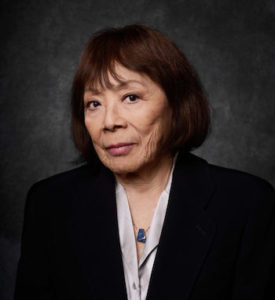
Toshiko Akiyoshi
*Toshiko Akiyoshi was born on this date in 1929. She is a Japanese-American jazz pianist, composer, arranger, and bandleader.
Toshiko Akiyoshi was born in Liaoyang, Manchuria, to Japanese emigrants. She was the youngest of four sisters. In 1945, after World War II, Akiyoshi's family lost their home and returned to Japan, settling in Beppu. A local record collector introduced her to jazz by playing a record of Teddy Wilson playing "Sweet Lorraine."
She immediately loved the sound and began to study jazz. In 1952, during a tour of Japan, pianist Oscar Peterson discovered her playing in a club on the Ginza. He was impressed and convinced record producer Norman Granz to record her. In 1953, under Granz's direction, she recorded her first album with Peterson's rhythm section: Herb Ellis on guitar, Ray Brown on double bass, and J. C. Heard on drums. In January 1956, she became the first Japanese student at Berklee. Soon after, she appeared as a contestant on the broadcast of the television panel show What's My Line?
Akiyoshi married saxophonist Charlie Mariano in 1959. The couple had a daughter, Michiru. She and Mariano divorced in 1967 after forming several bands together. During the same year, she met saxophonist Lew Tabackin, whom she married in 1969, and formed a 16-piece big band composed of studio musicians. Akiyoshi composed and arranged music for the band, and Tabackin served as the band's featured soloist on the tenor saxophone and flute. When Duke Ellington died in 1974, The Village Voice published that Ellington's music reflected his African heritage. Akiyoshi was inspired to investigate her Japanese musical heritage.
She composed using Japanese themes, harmonies, and instruments (kotsuzumi, kakko, utai, tsugaru shamisen). Yet her music remained planted firmly in jazz, reflecting influences from Duke Ellington, Charles Mingus, and Bud Powell. The couple moved to New York City in 1982 and assembled the Toshiko Akiyoshi Jazz Orchestra featuring Lew Tabackin). Although Akiyoshi released several albums in the U.S. featuring her piano in solo and small-combo settings, many of her later big band albums were released only in Japan. 1998, she was awarded an Honorary Doctor of Music from Berklee College of Music.
In 1999, Kyudo Nakagawa, a Buddhist priest, approached Akiyoshi, who asked her to write a piece for his hometown of Hiroshima. He sent her some photos of the aftermath of the nuclear bombing. Her initial reaction was horror. She could not see how she could compose anything to address the event. Finally, she found a picture of a young woman emerging from an underground shelter with a faint smile. Akiyoshi said that after seeing this picture, she understood the message: hope. With that message in mind, she composed the three-part Hiroshima: Rising from the Abyss suite. The piece premiered in Hiroshima on August 6, 2001, the 56th anniversary of the Hiroshima bombing. The Hiroshima suite appeared on the 2002 album Hiroshima, Rising from the Abyss.
In December 2003, her band played its final concert at Birdland in New York City, where it had enjoyed a regular Monday night gig for more than seven years. Akiyoshi explained that she disbanded the ensemble because she was frustrated by her inability to obtain U.S. recording contracts for the big band. She also said that she wanted to concentrate on her piano playing, from which she had been distracted by years of composing and arranging. She has said that although she has rarely recorded as a solo pianist, that is her preferred format.
She has received fourteen Grammy Award nominations and was the first woman to win Best Arranger and Composer awards in Down Beat magazine's annual Readers' Poll. In 1984, she was the subject of the documentary Jazz Is My Native Language. In 1996, she published her autobiography, Life with Jazz, and in 2007, she was named an NEA Jazz Master by the U.S. National Endowment for the Arts.